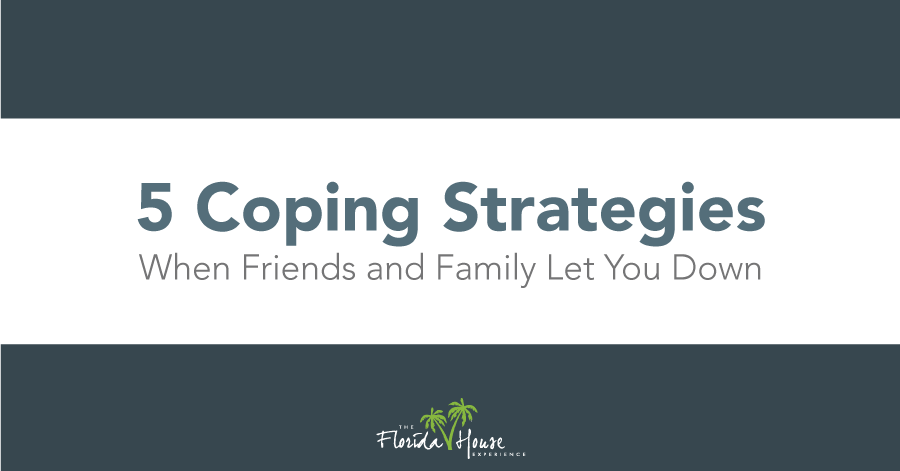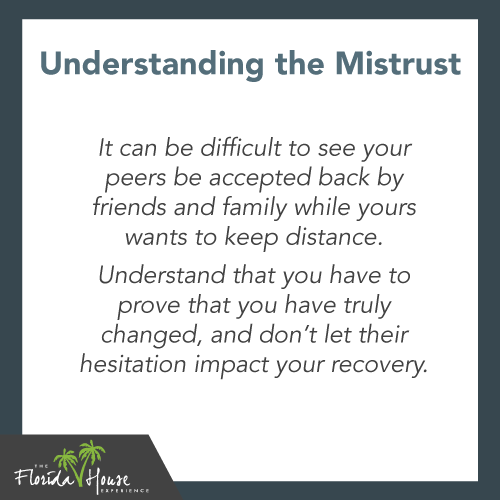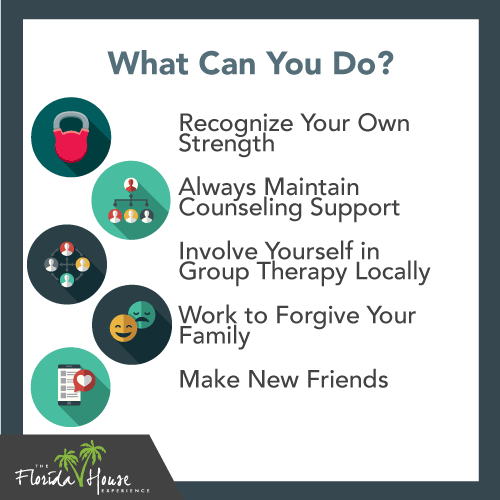
Drug and alcohol treatment is physically and emotionally demanding. Detox takes a physical toll on your body, often creating pain and life-threatening complications. Yet, the emotional struggle and lack of support from family and friends can be even more crushing.
Individuals who are in recovery may feel as though their loved ones aren’t helping. Friends have come and gone, and it’s possible that some supports may simply not be there when you feel most in need. Fortunately, there are ways to cope with this.
Do You Feel as if You’re Losing Friends and Family?
Many people feel support and encouragement as they enter rehab from loved ones who push them to get help. They develop strong relationships with those in rehab as well. These types of emotional support systems are a good thing. They can help you to keep moving forward. But sometimes things change.
Over the course of any recovery, you may feel as though friends are no longer supportive. Family and friends who were once there to support you don’t seem to be around. You are still battling your addiction, yet they’ve moved on with their lives. It’s important to understand why this is happening.
Expectations of Other People In Recovery Should Have Limits
 The ties you develop in recovery are tenuous. It is very difficult to see the people who journeyed through rehab and recovery with you moving on with their lives. Another common situation occurs when someone you went to rehab with relapses.
The ties you develop in recovery are tenuous. It is very difficult to see the people who journeyed through rehab and recovery with you moving on with their lives. Another common situation occurs when someone you went to rehab with relapses.
According to the National Institute on Drug Abuse, an estimated 40 to 60 percent of people will relapse at some point. When you see this happen to them, and they seem to disappear, you worry. It also makes you question your own recovery.
Some individuals in rehab seem to improve well. As they move into recovery, they want to return to their families. If this is you, you may find it devastating that your family isn’t always reliable.
Perhaps they don’t want you to live with them. Or they don’t want to forgive you for your pre-rehab lifestyle. Many people just don’t understand why you used and why you couldn’t stop. This can leave you feeling crushed, left out and hopeless.
What You Can Do When Your Family Doesn’t Support You
 Having a support system in recovery is important. It may help you avoid relapse and could help you to rebuild your life the way you want. This often means stepping back into relationships that may be less strong right now or working with family members to improve ties.
Having a support system in recovery is important. It may help you avoid relapse and could help you to rebuild your life the way you want. This often means stepping back into relationships that may be less strong right now or working with family members to improve ties.
Family and friends are not the only support you have though. These tips can help you to develop a strong support system you can rely on long term.
Recognize Your Own Strength
Make sure your recovery is never dependent on other people. Recognize that you have the ability to move through your life one step at a time, rebuilding it without relying on your family. It isn’t easy to do, but you can make new relationships and create new strength in yourself by working through problems on your own.
Your recovery should not be dependent on whether a particular family member supports you or provides you with a place to live. Work with your counseling team to develop a plan that truly gives you the ability to rebuild on your terms.
Always Maintain Counseling Support
Entering rehab and working through a 60-day program isn’t enough for most people. You need ongoing support from your counseling team. At FHE Health, you can continue through aftercare programs to get this level of support.
In the long term, it ensures that when you are thinking about using, there is someone to answer your call. Your counselor can help give you that strength when no one else does.
Involve Yourself in Group Therapy Locally
A number of 12-step programs are available to you. Most areas have numerous programs led by others who are living in recovery, just like you. Be a part of these communities by going to meetings as often as you need to.
To improve your own emotional health, learn to be there for others. In these group sessions, try to mentor those who have yet to enroll in rehab or who are thinking about using. By doing this, you form new bonds, but you also learn just how strong you are personally.
Work to Forgive Your Family
It’s not always possible to fix all your relationships when heading into recovery. Your parents may still blame you for the mistakes you made or for not being able to stop using. Your friendships may seem impossible to fix.
That’s okay. Forgive your family and friends for anything you feel you need to. Then, move on.
Don’t dwell on the what-ifs. As you work to rebuild your life, those individuals will see you are stronger and dedicated to recovery. Over time, this may allow them to step back into your life if you want them to.
Make New Friends
Friendships are very valuable to people in addiction recovery. They help to reduce your anxiety and encourage you to step back into social situations you may otherwise feel unable to be a part of right now. Friendships created in recovery can be some of the best because these friends know you at your worst.
Find friendships in your new places of employment or where you go to school. Develop relationships with people you meet throughout the day. Be open to talking to others as much as possible.
Getting the Support You Need at FHE Health
There’s no doubt your improved health and emotional stability start in rehab. For those with a substance use disorder, now is the best time to find out how much help is available to you. At FHE Health, you receive comprehensive support and encouragement every day you are in our program.
A key component of this program is providing you with one-on-one guidance so you don’t just count on others; you make sure your recovery isn’t dependent on other people. It’s a critical component to being able to maintain a long-term, healthy recovery.
We encourage you to contact our admissions team at FHE Health to learn more about what you can expect from our detox, recovery and aftercare programs.






